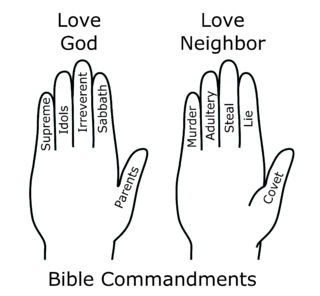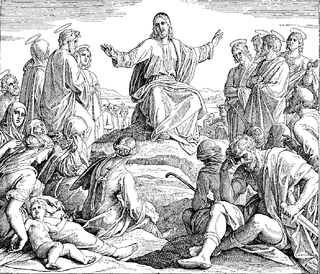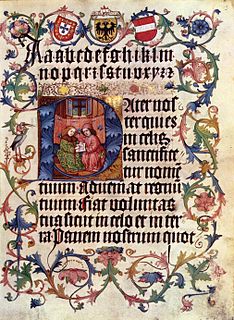
Matthew 5 is the fifth chapter of the Gospel of Matthew in the New Testament. It contains the first portion of the Sermon on the Mount, the other portions of which are contained in chapters 6 and 7. Portions are similar to the Sermon on the Plain in Luke 6, but much of the material is found only in Matthew. It is one of the most discussed and analyzed chapters of the New Testament. Warren Kissinger reports that among Early Christians no chapter was more often cited by early scholars. The same is true in modern scholarship.

Matthew 5:23 and Matthew 5:24 are a pair of closely related verses in the fifth chapter of the Gospel of Matthew in the New Testament. They are part of the Sermon on the Mount. Jesus has just announced that anger leads to murder, and anger is just as bad as murder itself. And that whosoever is angry with his brother shall be in danger of the judgment himself. This verse states that resolving these disputes should take priority over religious rituals.

Matthew 5:25 is the twenty-fifth verse of the fifth chapter of the Gospel of Matthew in the New Testament and is part of the Sermon on the Mount. In this first of the 6 Antitheses Jesus has been attacking anger and advocating reconciliation. In this verse he states that it is prudential to quickly reach agreement with one's adversary.

Matthew 5:30 is the thirtieth verse of the fifth chapter of the Gospel of Matthew in the New Testament and is part of the Sermon on the Mount. Part of the section on adultery, it is very similar to the previous verse, but with the hand mentioned instead of the eye. For a discussion of the radicalism of these verses see Matthew 5:29. Jesus had stated that looking at a woman in lust is equal to the act of adultery itself and in this verse he recommends cutting off one's hand to prevent sinning.

Matthew 5:33 is the thirty-third verse of the fifth chapter of the Gospel of Matthew in the New Testament and is part of the Sermon on the Mount. This verse is the opening of the fourth antithesis, beginning the discussion of oaths.

Matthew 5:39 is the thirty-ninth verse of the fifth chapter of the Gospel of Matthew in the New Testament and is part of the Sermon on the Mount. This is the second verse of the antithesis on the command: "eye for an eye". In one of the most famous verses in the New Testament, Jesus here rejects revenge and retaliation, instead telling his followers to turn the other cheek.

Matthew 5:40 is the fortieth verse of the fifth chapter of the Gospel of Matthew in the New Testament and is part of the Sermon on the Mount. This is the third verse of the antithesis on the commandment: "Eye for an eye".

Matthew 5:43 is the forty-third verse of the fifth chapter of the Gospel of Matthew in the New Testament and is part of the Sermon on the Mount. This verse is the opening of the final antithesis, that on the commandment to "Love thy neighbour as thyself".

Matthew 6:2 is the second verse of the sixth chapter of the Gospel of Matthew in the New Testament and is part of the Sermon on the Mount. This verse continues the discussion of how even good deeds can be done for the wrong reasons.

Matthew 6:3 is the third verse of the sixth chapter of the Gospel of Matthew in the New Testament and is part of the Sermon on the Mount. This verse continues the discussion of how one should give to charity.

Matthew 6:4 is the fourth verse of the sixth chapter of the Gospel of Matthew in the New Testament and is part of the Sermon on the Mount. This is the final verse of the Sermon's discussion of alms giving.

Matthew 6:17 is the seventeenth verse of the sixth chapter of the Gospel of Matthew in the New Testament and is part of the Sermon on the Mount. This verse continues the discussion of fasting.

Matthew 6:18 is the eighteenth verse of the sixth chapter of the Gospel of Matthew in the New Testament and is part of the Sermon on the Mount. This verse concludes the discussion of fasting.

Matthew 6:22 is the twenty-second verse of the sixth chapter of the Gospel of Matthew in the New Testament, and is part of the Sermon on the Mount.

Matthew 6:23 is the twenty-third verse of the sixth chapter of the Gospel of Matthew in the New Testament and is part of the Sermon on the Mount.

Matthew 7:3 is the third verse of the seventh chapter of the Gospel of Matthew in the New Testament and is part of the Sermon on the Mount. This verse continues the discussion of judgmentalism.

Matthew 7:5 is the fifth verse of the seventh chapter of the Gospel of Matthew in the New Testament and is part of the Sermon on the Mount. This verse continues the discussion of judgmentalism.

Matthew 7 is the seventh chapter of the Gospel of Matthew in the New Testament. The chapter is the last of the three chapters which comprise the Sermon on the Mount.

The Mote and the Beam is a parable of Jesus given in the Sermon on the Mount in the Gospel of Matthew, chapter 7, verses 1 to 5. The discourse is fairly brief, and begins by warning his followers of the dangers of judging others, stating that they too would be judged by the same standard. The Sermon on the Plain has a similar passage in Luke 6:37–42.

Matthew 6 is the sixth chapter of the Gospel of Matthew in the New Testament. This chapter contains the middle portion of the Sermon on the Mount, including the Lord's Prayer.



















